Effective Business Communication: Management and Cultural Impact
VerifiedAdded on 2022/10/01
|7
|2260
|316
Essay
AI Summary
This essay delves into the multifaceted world of effective business communication, examining its significance in fostering growth, productivity, and customer relationships. It highlights the importance of adapting communication styles to different cultural contexts, with a specific focus on Australian business practices, which emphasize directness and informality. The essay explores the competencies required for effective communication, including adaptability, active listening, and emotional intelligence, particularly for employees working overseas. It contrasts these with the consequences of communication incompetency, such as project delays and disgruntled customers, and emphasizes the importance of training and ethical conduct. The conclusion reinforces the impact of verbal, nonverbal and written communication on employee performance, organizational outcomes, and cultural understanding.
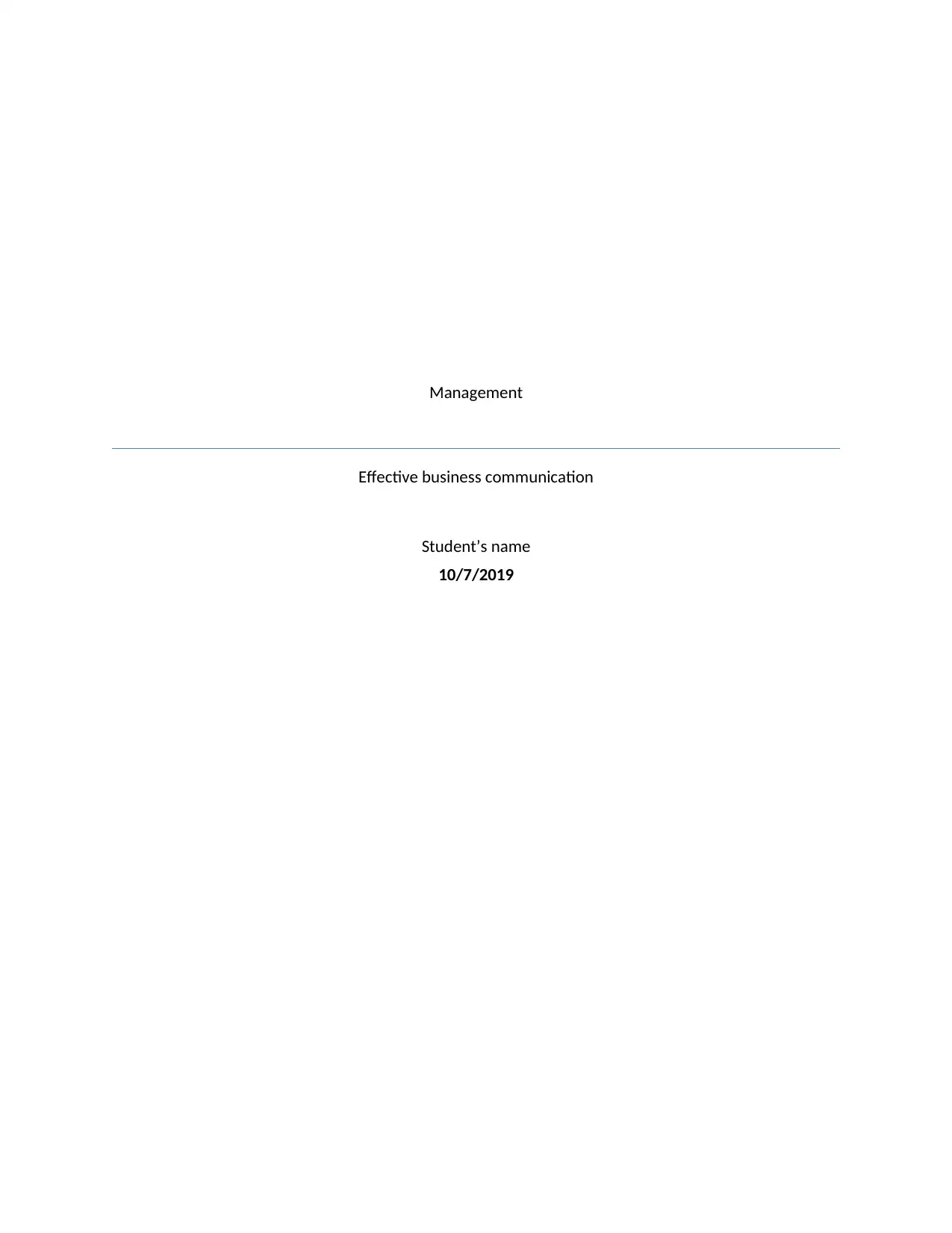
Management
Effective business communication
Student’s name
10/7/2019
Effective business communication
Student’s name
10/7/2019
Paraphrase This Document
Need a fresh take? Get an instant paraphrase of this document with our AI Paraphraser
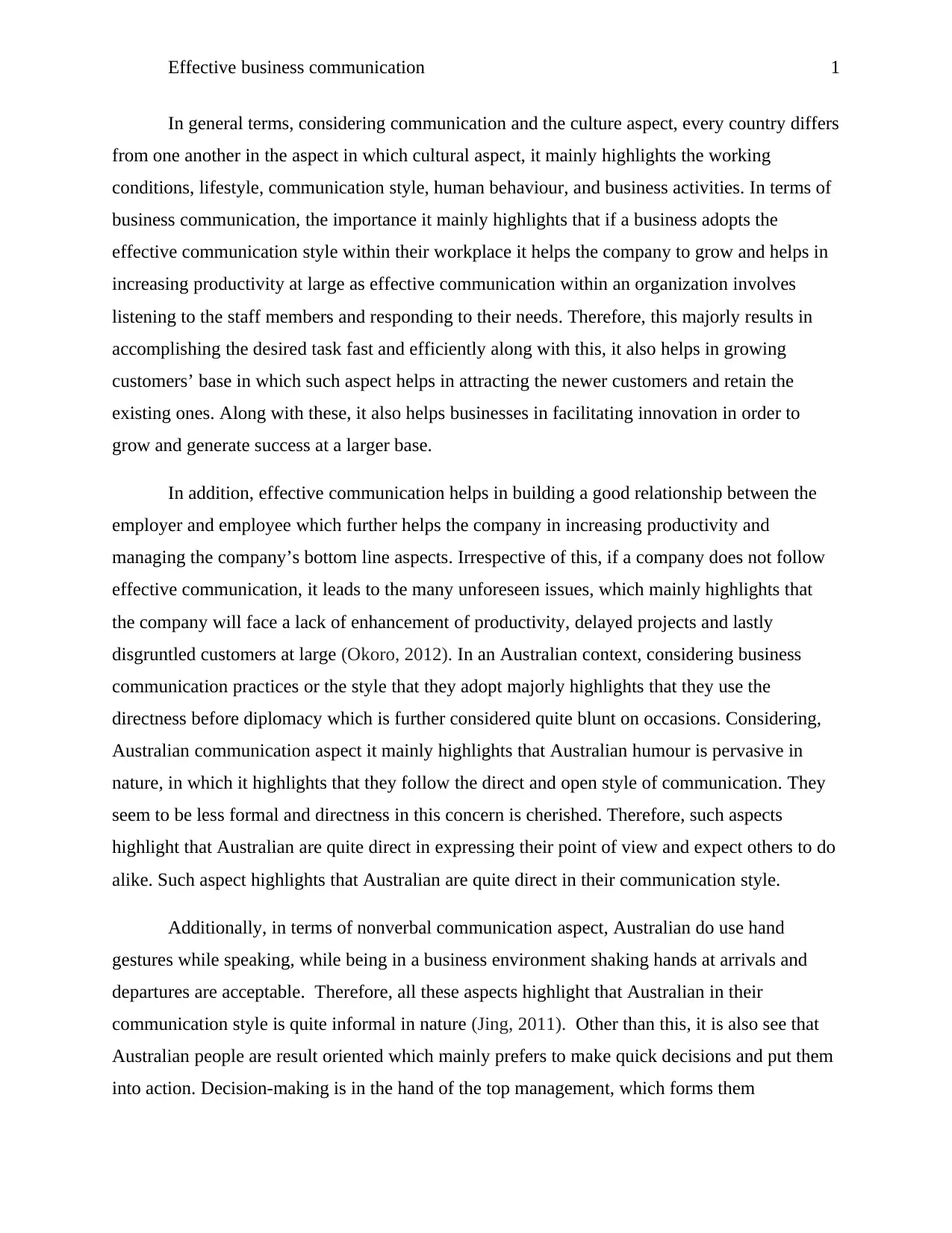
Effective business communication 1
In general terms, considering communication and the culture aspect, every country differs
from one another in the aspect in which cultural aspect, it mainly highlights the working
conditions, lifestyle, communication style, human behaviour, and business activities. In terms of
business communication, the importance it mainly highlights that if a business adopts the
effective communication style within their workplace it helps the company to grow and helps in
increasing productivity at large as effective communication within an organization involves
listening to the staff members and responding to their needs. Therefore, this majorly results in
accomplishing the desired task fast and efficiently along with this, it also helps in growing
customers’ base in which such aspect helps in attracting the newer customers and retain the
existing ones. Along with these, it also helps businesses in facilitating innovation in order to
grow and generate success at a larger base.
In addition, effective communication helps in building a good relationship between the
employer and employee which further helps the company in increasing productivity and
managing the company’s bottom line aspects. Irrespective of this, if a company does not follow
effective communication, it leads to the many unforeseen issues, which mainly highlights that
the company will face a lack of enhancement of productivity, delayed projects and lastly
disgruntled customers at large (Okoro, 2012). In an Australian context, considering business
communication practices or the style that they adopt majorly highlights that they use the
directness before diplomacy which is further considered quite blunt on occasions. Considering,
Australian communication aspect it mainly highlights that Australian humour is pervasive in
nature, in which it highlights that they follow the direct and open style of communication. They
seem to be less formal and directness in this concern is cherished. Therefore, such aspects
highlight that Australian are quite direct in expressing their point of view and expect others to do
alike. Such aspect highlights that Australian are quite direct in their communication style.
Additionally, in terms of nonverbal communication aspect, Australian do use hand
gestures while speaking, while being in a business environment shaking hands at arrivals and
departures are acceptable. Therefore, all these aspects highlight that Australian in their
communication style is quite informal in nature (Jing, 2011). Other than this, it is also see that
Australian people are result oriented which mainly prefers to make quick decisions and put them
into action. Decision-making is in the hand of the top management, which forms them
In general terms, considering communication and the culture aspect, every country differs
from one another in the aspect in which cultural aspect, it mainly highlights the working
conditions, lifestyle, communication style, human behaviour, and business activities. In terms of
business communication, the importance it mainly highlights that if a business adopts the
effective communication style within their workplace it helps the company to grow and helps in
increasing productivity at large as effective communication within an organization involves
listening to the staff members and responding to their needs. Therefore, this majorly results in
accomplishing the desired task fast and efficiently along with this, it also helps in growing
customers’ base in which such aspect helps in attracting the newer customers and retain the
existing ones. Along with these, it also helps businesses in facilitating innovation in order to
grow and generate success at a larger base.
In addition, effective communication helps in building a good relationship between the
employer and employee which further helps the company in increasing productivity and
managing the company’s bottom line aspects. Irrespective of this, if a company does not follow
effective communication, it leads to the many unforeseen issues, which mainly highlights that
the company will face a lack of enhancement of productivity, delayed projects and lastly
disgruntled customers at large (Okoro, 2012). In an Australian context, considering business
communication practices or the style that they adopt majorly highlights that they use the
directness before diplomacy which is further considered quite blunt on occasions. Considering,
Australian communication aspect it mainly highlights that Australian humour is pervasive in
nature, in which it highlights that they follow the direct and open style of communication. They
seem to be less formal and directness in this concern is cherished. Therefore, such aspects
highlight that Australian are quite direct in expressing their point of view and expect others to do
alike. Such aspect highlights that Australian are quite direct in their communication style.
Additionally, in terms of nonverbal communication aspect, Australian do use hand
gestures while speaking, while being in a business environment shaking hands at arrivals and
departures are acceptable. Therefore, all these aspects highlight that Australian in their
communication style is quite informal in nature (Jing, 2011). Other than this, it is also see that
Australian people are result oriented which mainly prefers to make quick decisions and put them
into action. Decision-making is in the hand of the top management, which forms them
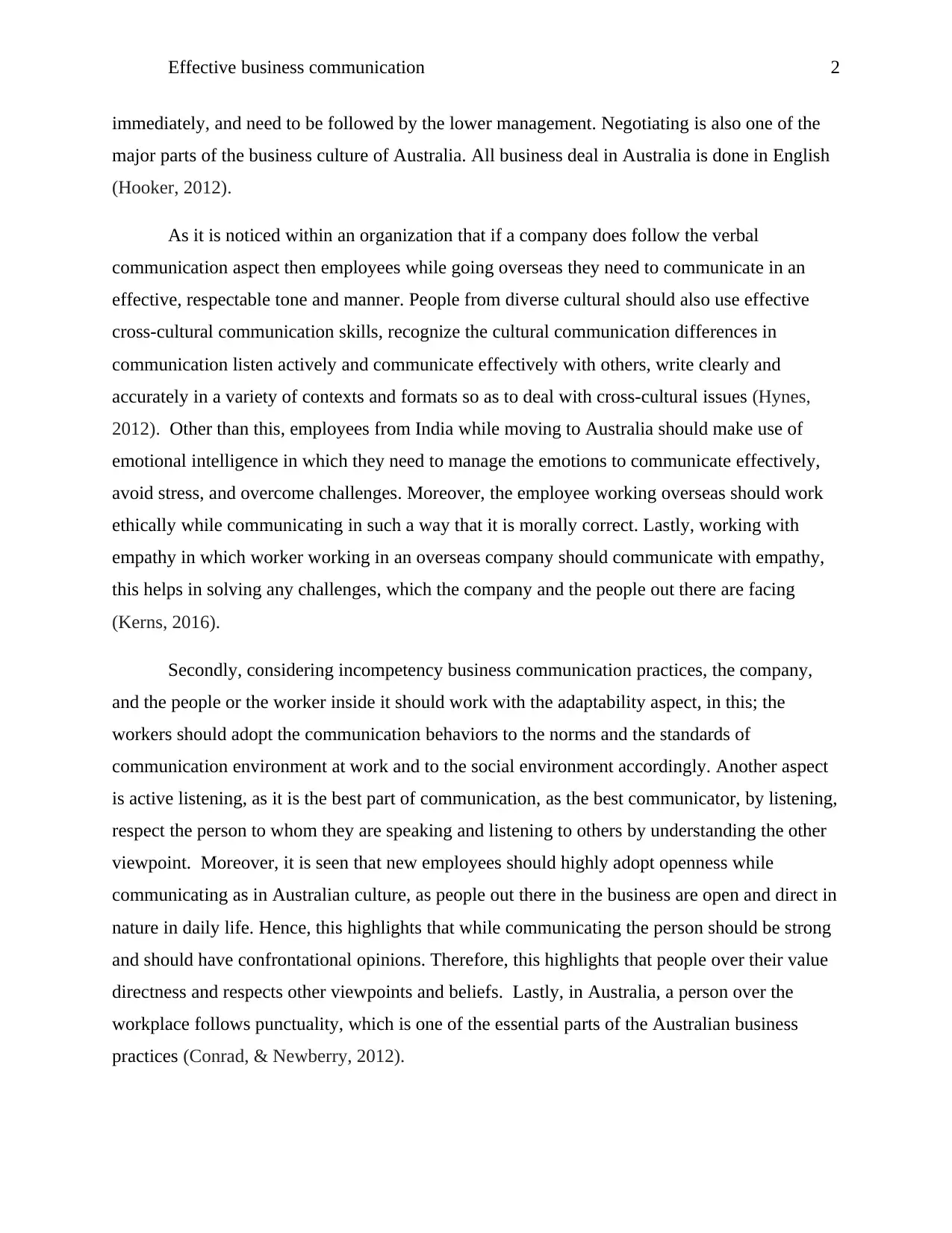
Effective business communication 2
immediately, and need to be followed by the lower management. Negotiating is also one of the
major parts of the business culture of Australia. All business deal in Australia is done in English
(Hooker, 2012).
As it is noticed within an organization that if a company does follow the verbal
communication aspect then employees while going overseas they need to communicate in an
effective, respectable tone and manner. People from diverse cultural should also use effective
cross-cultural communication skills, recognize the cultural communication differences in
communication listen actively and communicate effectively with others, write clearly and
accurately in a variety of contexts and formats so as to deal with cross-cultural issues (Hynes,
2012). Other than this, employees from India while moving to Australia should make use of
emotional intelligence in which they need to manage the emotions to communicate effectively,
avoid stress, and overcome challenges. Moreover, the employee working overseas should work
ethically while communicating in such a way that it is morally correct. Lastly, working with
empathy in which worker working in an overseas company should communicate with empathy,
this helps in solving any challenges, which the company and the people out there are facing
(Kerns, 2016).
Secondly, considering incompetency business communication practices, the company,
and the people or the worker inside it should work with the adaptability aspect, in this; the
workers should adopt the communication behaviors to the norms and the standards of
communication environment at work and to the social environment accordingly. Another aspect
is active listening, as it is the best part of communication, as the best communicator, by listening,
respect the person to whom they are speaking and listening to others by understanding the other
viewpoint. Moreover, it is seen that new employees should highly adopt openness while
communicating as in Australian culture, as people out there in the business are open and direct in
nature in daily life. Hence, this highlights that while communicating the person should be strong
and should have confrontational opinions. Therefore, this highlights that people over their value
directness and respects other viewpoints and beliefs. Lastly, in Australia, a person over the
workplace follows punctuality, which is one of the essential parts of the Australian business
practices (Conrad, & Newberry, 2012).
immediately, and need to be followed by the lower management. Negotiating is also one of the
major parts of the business culture of Australia. All business deal in Australia is done in English
(Hooker, 2012).
As it is noticed within an organization that if a company does follow the verbal
communication aspect then employees while going overseas they need to communicate in an
effective, respectable tone and manner. People from diverse cultural should also use effective
cross-cultural communication skills, recognize the cultural communication differences in
communication listen actively and communicate effectively with others, write clearly and
accurately in a variety of contexts and formats so as to deal with cross-cultural issues (Hynes,
2012). Other than this, employees from India while moving to Australia should make use of
emotional intelligence in which they need to manage the emotions to communicate effectively,
avoid stress, and overcome challenges. Moreover, the employee working overseas should work
ethically while communicating in such a way that it is morally correct. Lastly, working with
empathy in which worker working in an overseas company should communicate with empathy,
this helps in solving any challenges, which the company and the people out there are facing
(Kerns, 2016).
Secondly, considering incompetency business communication practices, the company,
and the people or the worker inside it should work with the adaptability aspect, in this; the
workers should adopt the communication behaviors to the norms and the standards of
communication environment at work and to the social environment accordingly. Another aspect
is active listening, as it is the best part of communication, as the best communicator, by listening,
respect the person to whom they are speaking and listening to others by understanding the other
viewpoint. Moreover, it is seen that new employees should highly adopt openness while
communicating as in Australian culture, as people out there in the business are open and direct in
nature in daily life. Hence, this highlights that while communicating the person should be strong
and should have confrontational opinions. Therefore, this highlights that people over their value
directness and respects other viewpoints and beliefs. Lastly, in Australia, a person over the
workplace follows punctuality, which is one of the essential parts of the Australian business
practices (Conrad, & Newberry, 2012).
⊘ This is a preview!⊘
Do you want full access?
Subscribe today to unlock all pages.

Trusted by 1+ million students worldwide
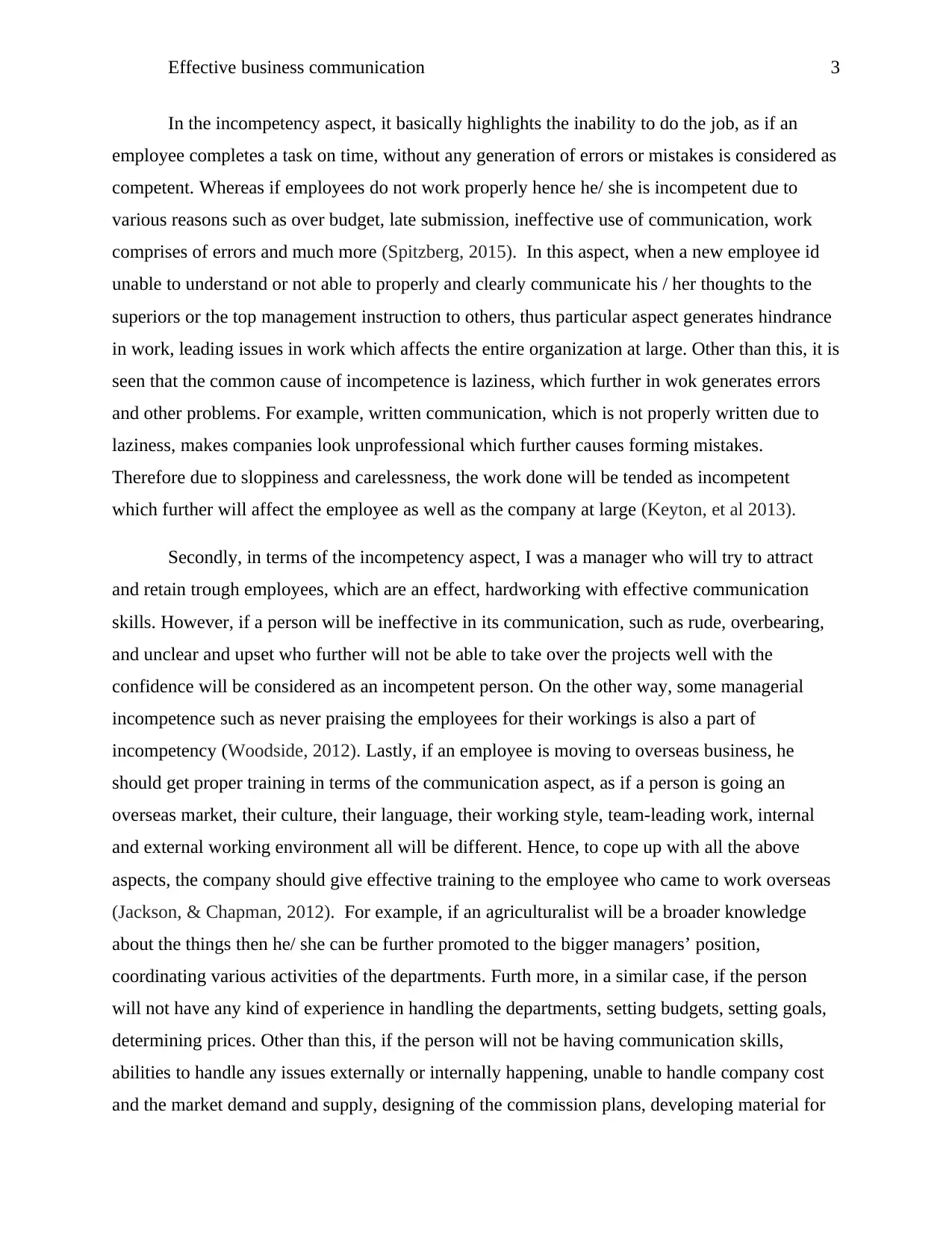
Effective business communication 3
In the incompetency aspect, it basically highlights the inability to do the job, as if an
employee completes a task on time, without any generation of errors or mistakes is considered as
competent. Whereas if employees do not work properly hence he/ she is incompetent due to
various reasons such as over budget, late submission, ineffective use of communication, work
comprises of errors and much more (Spitzberg, 2015). In this aspect, when a new employee id
unable to understand or not able to properly and clearly communicate his / her thoughts to the
superiors or the top management instruction to others, thus particular aspect generates hindrance
in work, leading issues in work which affects the entire organization at large. Other than this, it is
seen that the common cause of incompetence is laziness, which further in wok generates errors
and other problems. For example, written communication, which is not properly written due to
laziness, makes companies look unprofessional which further causes forming mistakes.
Therefore due to sloppiness and carelessness, the work done will be tended as incompetent
which further will affect the employee as well as the company at large (Keyton, et al 2013).
Secondly, in terms of the incompetency aspect, I was a manager who will try to attract
and retain trough employees, which are an effect, hardworking with effective communication
skills. However, if a person will be ineffective in its communication, such as rude, overbearing,
and unclear and upset who further will not be able to take over the projects well with the
confidence will be considered as an incompetent person. On the other way, some managerial
incompetence such as never praising the employees for their workings is also a part of
incompetency (Woodside, 2012). Lastly, if an employee is moving to overseas business, he
should get proper training in terms of the communication aspect, as if a person is going an
overseas market, their culture, their language, their working style, team-leading work, internal
and external working environment all will be different. Hence, to cope up with all the above
aspects, the company should give effective training to the employee who came to work overseas
(Jackson, & Chapman, 2012). For example, if an agriculturalist will be a broader knowledge
about the things then he/ she can be further promoted to the bigger managers’ position,
coordinating various activities of the departments. Furth more, in a similar case, if the person
will not have any kind of experience in handling the departments, setting budgets, setting goals,
determining prices. Other than this, if the person will not be having communication skills,
abilities to handle any issues externally or internally happening, unable to handle company cost
and the market demand and supply, designing of the commission plans, developing material for
In the incompetency aspect, it basically highlights the inability to do the job, as if an
employee completes a task on time, without any generation of errors or mistakes is considered as
competent. Whereas if employees do not work properly hence he/ she is incompetent due to
various reasons such as over budget, late submission, ineffective use of communication, work
comprises of errors and much more (Spitzberg, 2015). In this aspect, when a new employee id
unable to understand or not able to properly and clearly communicate his / her thoughts to the
superiors or the top management instruction to others, thus particular aspect generates hindrance
in work, leading issues in work which affects the entire organization at large. Other than this, it is
seen that the common cause of incompetence is laziness, which further in wok generates errors
and other problems. For example, written communication, which is not properly written due to
laziness, makes companies look unprofessional which further causes forming mistakes.
Therefore due to sloppiness and carelessness, the work done will be tended as incompetent
which further will affect the employee as well as the company at large (Keyton, et al 2013).
Secondly, in terms of the incompetency aspect, I was a manager who will try to attract
and retain trough employees, which are an effect, hardworking with effective communication
skills. However, if a person will be ineffective in its communication, such as rude, overbearing,
and unclear and upset who further will not be able to take over the projects well with the
confidence will be considered as an incompetent person. On the other way, some managerial
incompetence such as never praising the employees for their workings is also a part of
incompetency (Woodside, 2012). Lastly, if an employee is moving to overseas business, he
should get proper training in terms of the communication aspect, as if a person is going an
overseas market, their culture, their language, their working style, team-leading work, internal
and external working environment all will be different. Hence, to cope up with all the above
aspects, the company should give effective training to the employee who came to work overseas
(Jackson, & Chapman, 2012). For example, if an agriculturalist will be a broader knowledge
about the things then he/ she can be further promoted to the bigger managers’ position,
coordinating various activities of the departments. Furth more, in a similar case, if the person
will not have any kind of experience in handling the departments, setting budgets, setting goals,
determining prices. Other than this, if the person will not be having communication skills,
abilities to handle any issues externally or internally happening, unable to handle company cost
and the market demand and supply, designing of the commission plans, developing material for
Paraphrase This Document
Need a fresh take? Get an instant paraphrase of this document with our AI Paraphraser
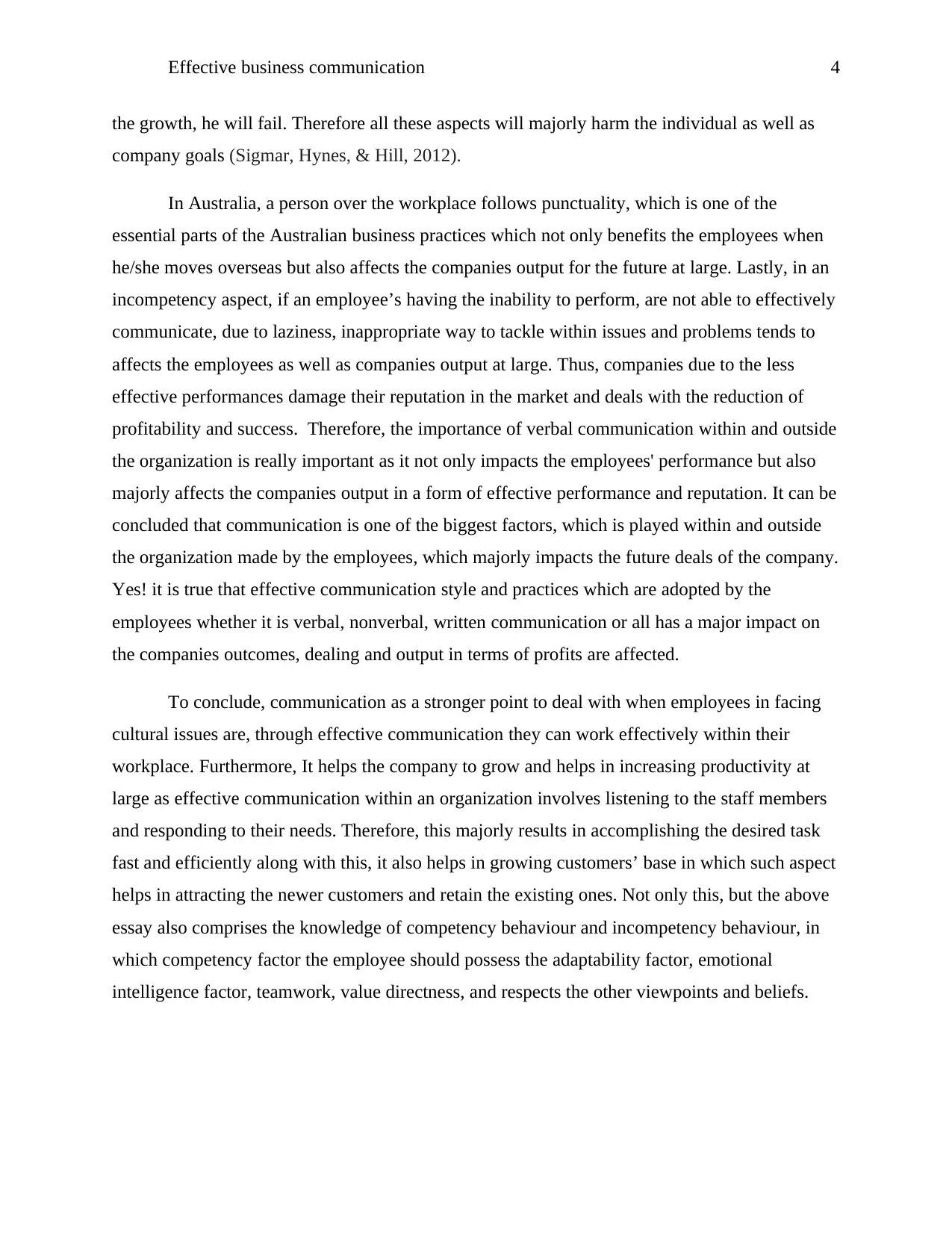
Effective business communication 4
the growth, he will fail. Therefore all these aspects will majorly harm the individual as well as
company goals (Sigmar, Hynes, & Hill, 2012).
In Australia, a person over the workplace follows punctuality, which is one of the
essential parts of the Australian business practices which not only benefits the employees when
he/she moves overseas but also affects the companies output for the future at large. Lastly, in an
incompetency aspect, if an employee’s having the inability to perform, are not able to effectively
communicate, due to laziness, inappropriate way to tackle within issues and problems tends to
affects the employees as well as companies output at large. Thus, companies due to the less
effective performances damage their reputation in the market and deals with the reduction of
profitability and success. Therefore, the importance of verbal communication within and outside
the organization is really important as it not only impacts the employees' performance but also
majorly affects the companies output in a form of effective performance and reputation. It can be
concluded that communication is one of the biggest factors, which is played within and outside
the organization made by the employees, which majorly impacts the future deals of the company.
Yes! it is true that effective communication style and practices which are adopted by the
employees whether it is verbal, nonverbal, written communication or all has a major impact on
the companies outcomes, dealing and output in terms of profits are affected.
To conclude, communication as a stronger point to deal with when employees in facing
cultural issues are, through effective communication they can work effectively within their
workplace. Furthermore, It helps the company to grow and helps in increasing productivity at
large as effective communication within an organization involves listening to the staff members
and responding to their needs. Therefore, this majorly results in accomplishing the desired task
fast and efficiently along with this, it also helps in growing customers’ base in which such aspect
helps in attracting the newer customers and retain the existing ones. Not only this, but the above
essay also comprises the knowledge of competency behaviour and incompetency behaviour, in
which competency factor the employee should possess the adaptability factor, emotional
intelligence factor, teamwork, value directness, and respects the other viewpoints and beliefs.
the growth, he will fail. Therefore all these aspects will majorly harm the individual as well as
company goals (Sigmar, Hynes, & Hill, 2012).
In Australia, a person over the workplace follows punctuality, which is one of the
essential parts of the Australian business practices which not only benefits the employees when
he/she moves overseas but also affects the companies output for the future at large. Lastly, in an
incompetency aspect, if an employee’s having the inability to perform, are not able to effectively
communicate, due to laziness, inappropriate way to tackle within issues and problems tends to
affects the employees as well as companies output at large. Thus, companies due to the less
effective performances damage their reputation in the market and deals with the reduction of
profitability and success. Therefore, the importance of verbal communication within and outside
the organization is really important as it not only impacts the employees' performance but also
majorly affects the companies output in a form of effective performance and reputation. It can be
concluded that communication is one of the biggest factors, which is played within and outside
the organization made by the employees, which majorly impacts the future deals of the company.
Yes! it is true that effective communication style and practices which are adopted by the
employees whether it is verbal, nonverbal, written communication or all has a major impact on
the companies outcomes, dealing and output in terms of profits are affected.
To conclude, communication as a stronger point to deal with when employees in facing
cultural issues are, through effective communication they can work effectively within their
workplace. Furthermore, It helps the company to grow and helps in increasing productivity at
large as effective communication within an organization involves listening to the staff members
and responding to their needs. Therefore, this majorly results in accomplishing the desired task
fast and efficiently along with this, it also helps in growing customers’ base in which such aspect
helps in attracting the newer customers and retain the existing ones. Not only this, but the above
essay also comprises the knowledge of competency behaviour and incompetency behaviour, in
which competency factor the employee should possess the adaptability factor, emotional
intelligence factor, teamwork, value directness, and respects the other viewpoints and beliefs.
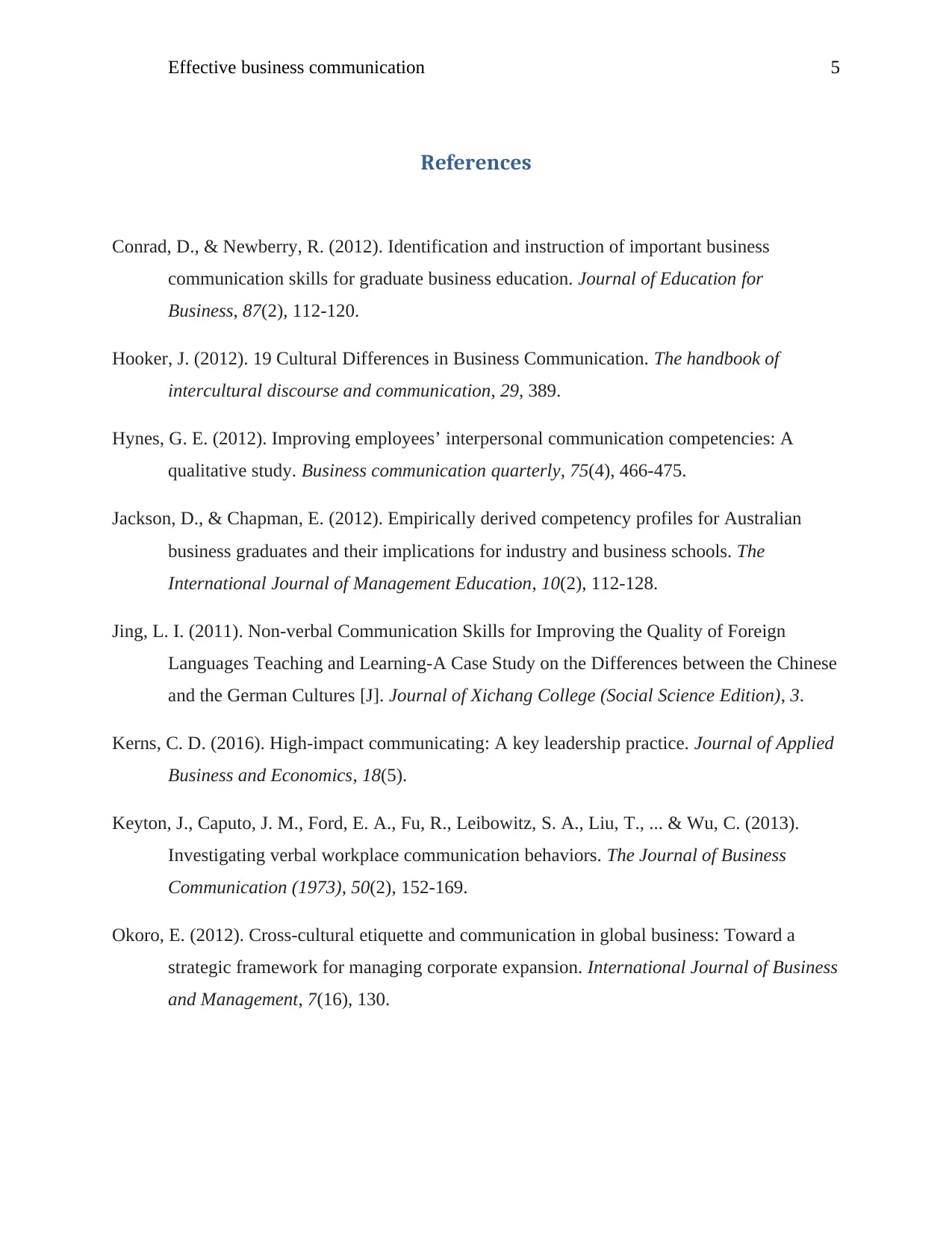
Effective business communication 5
References
Conrad, D., & Newberry, R. (2012). Identification and instruction of important business
communication skills for graduate business education. Journal of Education for
Business, 87(2), 112-120.
Hooker, J. (2012). 19 Cultural Differences in Business Communication. The handbook of
intercultural discourse and communication, 29, 389.
Hynes, G. E. (2012). Improving employees’ interpersonal communication competencies: A
qualitative study. Business communication quarterly, 75(4), 466-475.
Jackson, D., & Chapman, E. (2012). Empirically derived competency profiles for Australian
business graduates and their implications for industry and business schools. The
International Journal of Management Education, 10(2), 112-128.
Jing, L. I. (2011). Non-verbal Communication Skills for Improving the Quality of Foreign
Languages Teaching and Learning-A Case Study on the Differences between the Chinese
and the German Cultures [J]. Journal of Xichang College (Social Science Edition), 3.
Kerns, C. D. (2016). High-impact communicating: A key leadership practice. Journal of Applied
Business and Economics, 18(5).
Keyton, J., Caputo, J. M., Ford, E. A., Fu, R., Leibowitz, S. A., Liu, T., ... & Wu, C. (2013).
Investigating verbal workplace communication behaviors. The Journal of Business
Communication (1973), 50(2), 152-169.
Okoro, E. (2012). Cross-cultural etiquette and communication in global business: Toward a
strategic framework for managing corporate expansion. International Journal of Business
and Management, 7(16), 130.
References
Conrad, D., & Newberry, R. (2012). Identification and instruction of important business
communication skills for graduate business education. Journal of Education for
Business, 87(2), 112-120.
Hooker, J. (2012). 19 Cultural Differences in Business Communication. The handbook of
intercultural discourse and communication, 29, 389.
Hynes, G. E. (2012). Improving employees’ interpersonal communication competencies: A
qualitative study. Business communication quarterly, 75(4), 466-475.
Jackson, D., & Chapman, E. (2012). Empirically derived competency profiles for Australian
business graduates and their implications for industry and business schools. The
International Journal of Management Education, 10(2), 112-128.
Jing, L. I. (2011). Non-verbal Communication Skills for Improving the Quality of Foreign
Languages Teaching and Learning-A Case Study on the Differences between the Chinese
and the German Cultures [J]. Journal of Xichang College (Social Science Edition), 3.
Kerns, C. D. (2016). High-impact communicating: A key leadership practice. Journal of Applied
Business and Economics, 18(5).
Keyton, J., Caputo, J. M., Ford, E. A., Fu, R., Leibowitz, S. A., Liu, T., ... & Wu, C. (2013).
Investigating verbal workplace communication behaviors. The Journal of Business
Communication (1973), 50(2), 152-169.
Okoro, E. (2012). Cross-cultural etiquette and communication in global business: Toward a
strategic framework for managing corporate expansion. International Journal of Business
and Management, 7(16), 130.
⊘ This is a preview!⊘
Do you want full access?
Subscribe today to unlock all pages.

Trusted by 1+ million students worldwide
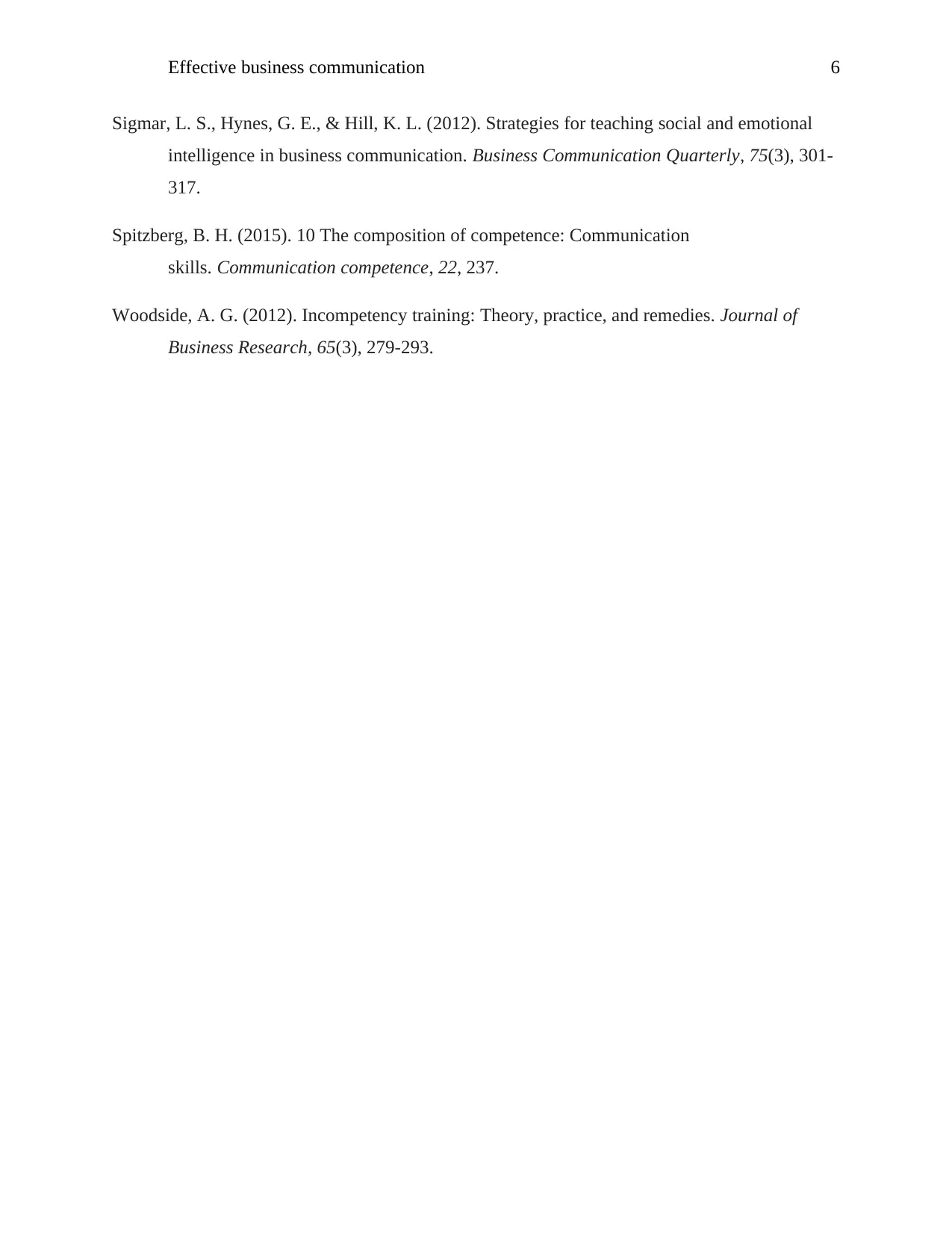
Effective business communication 6
Sigmar, L. S., Hynes, G. E., & Hill, K. L. (2012). Strategies for teaching social and emotional
intelligence in business communication. Business Communication Quarterly, 75(3), 301-
317.
Spitzberg, B. H. (2015). 10 The composition of competence: Communication
skills. Communication competence, 22, 237.
Woodside, A. G. (2012). Incompetency training: Theory, practice, and remedies. Journal of
Business Research, 65(3), 279-293.
Sigmar, L. S., Hynes, G. E., & Hill, K. L. (2012). Strategies for teaching social and emotional
intelligence in business communication. Business Communication Quarterly, 75(3), 301-
317.
Spitzberg, B. H. (2015). 10 The composition of competence: Communication
skills. Communication competence, 22, 237.
Woodside, A. G. (2012). Incompetency training: Theory, practice, and remedies. Journal of
Business Research, 65(3), 279-293.
1 out of 7
Related Documents
Your All-in-One AI-Powered Toolkit for Academic Success.
+13062052269
info@desklib.com
Available 24*7 on WhatsApp / Email
![[object Object]](/_next/static/media/star-bottom.7253800d.svg)
Unlock your academic potential
Copyright © 2020–2026 A2Z Services. All Rights Reserved. Developed and managed by ZUCOL.





